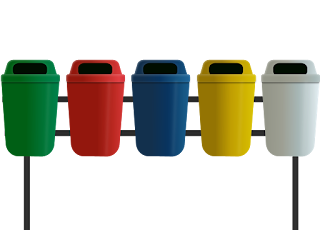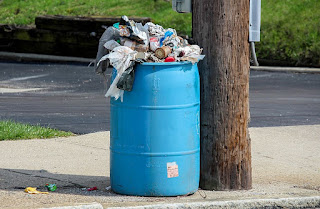India has
a big cultural heritage. We believe in god and we have a lot of
religious temples all over the country. Every morning devotees gather at
temples, worship god, & showers orange & red flowers on him.
Thereafter, many temples offer Mahaprasad to devotees. Some people prefer to go
back whereas some prefer to stay at religious temples. Whenever people visit any beautiful destination, a
little or more waste is always generated at these places.
Everyone
worships God out of love but no one thinks about what happens next with the
dried flowers & other food leftovers at Mahaprasad. According to research
& data, approximately more than 8 million tones of dried flowers are thrown
in the river every year, along with the fertilizers & pesticides used to
grow them. All of us can only imagine how badly the water sources will be
polluting due to the dead flowers thrown in clean water.
However,
we can recycle and reuse many wet wastages. It will reduce the volumes of scrap
creation and will also keep the religious places clean, hygienic, and
pollution-free. From a broader perspective, such a step will conserve nature,
maintain ecological balance, and support the local economy as well.
So, would
you like to discover a few more benefits of recycling flower scraps & food
leftovers:
Here are a
few things explained:
Creates earning opportunities
We all
know that every day enormous quantities of wet scraps are generated at temples.
Efficient manpower is mandatory for the collection, transportation, sorting,
and treatment of these wet scraps. As a result, scrap recycling creates
employment opportunities for local people. Consequently, such opportunities
also, help to raise the standard of living of villagers.
Boosts creativity
The temple
wet scraps mostly
contain yellow & orange marigold flowers, coconut shells, flower garlands,
etc. We can use dried yellow & orange marigold flowers to make aromatic
sticks and cones. Other flowers like rose, jasmine can also be used to make
pleasant perfumes. This will promote recycling activities at religious places
and will minimize the everyday waste volumes.
Generates new income source
The
innovative products like aromatic sticks & cones, perfumes can be sold in
the local shops nearby temples. Many devotees always purchase stick &
cones, coconut, and similar things from local vendors. The recycling of flowers
& organic leftovers will generate a good source of revenue for these
sellers. Also, it is cheaper in price as it is manufactured using recycled
materials.
Helps to maintain hygiene & cleanliness
When dry
flower scraps and other leftovers are recycled in a good manner, then it keeps
the nearby places neat and clean. Besides, it also keeps the rivers &
oceans free from pollution. As a result, villagers and tourists get clean water
to drink.
Recycling
flowers & other scraps also help to preserve the natural beauty of
temples, mosques & churches. Also, it creates a peaceful and healthy
atmosphere in the surroundings of the place. People feel peaceful whenever they
visit such holy places. Consequently, more and more people start to visit religious locations every year.
Preserves the natural resources
Whenever
humans throw wet wastages on the streets, rivers, & oceans, they tend to
pollute the clean drinking sources of that region. Such shameful acts degrade
the charm of the divine places.
On another hand, if we recycle the wastage then it keeps the localities clean and healthy. The bird and animal species living in these areas also get fresh air to breathe, freshwater, and fodder to eat. It safeguards and improves the overall health of the residents living in concerned areas.
Conclusion:
In India,
millions of people visit religious temples, churches, mosques every year.
People like you and me should always try our best to take the utmost care of
these places. The religious institutions can also recycle wet trash generated
each day. Recycling each and everything is one of the best options to sustain
the hygiene and cleanliness in these places.
The
religious institutions can install organic waste composter machine like
Goldust as well. The machine is compact in size. They can put dried flowers,
leaves & meal leftovers in Goldust. Goldust decomposes wet scraps and
produces manure that is ready for use. This manure can be used in gardening and
farming activities. All the process of composting is carried out in an
odorless, noiseless, and maintenance-free way.
Interested
to know more, kindly visit the website of LAHS Eco Engineering for more
relevant information.
























